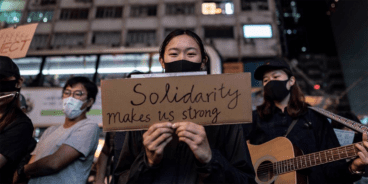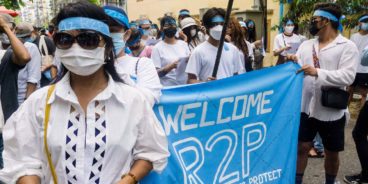
Statement by Gareth Evans at the February 2012 UN General Assembly Interactive Dialogue on the Responsibility While Protecting
Statement by the Hon Gareth Evans, Co-Chair of the Global Centre for the Responsibility to Protect at the Informal UNGA discussion on ‘Responsibility While Protecting’, hosted by the Permanent Mission of Brazil in the presence of Minister of External Relations Patriota
I thank his Excellency the Minister and his distinguished co-chair for inviting this statement.
Brazil’s “Responsibility While Protecting” initiative is an important and very constructive contribution to the debate, at a time where dialogue is urgently needed in the wake of criticism about the way the United Nations’ civilian protection mandate was implemented in Libya last year.
What is being questioned in the Brazilian initiative is not the merits of the R2P principle itself, but rather Security Council working methods – an issue that pre-dates R2P and has been under scrutiny in every case involving the always-sensitive question of the authorization of the use of force.
R2P itself is here to stay. Support in principle for its basic elements – the four crimes and three pillars – is now just about universal, as evidenced in successive General Assembly debates since 2009. Institutional capacity to apply R2P operationally is steadily developing, most visibly with the ‘focal points’ now being established within national governments and intergovernmental organizations, an innovation that we urge every member state to replicate.
And, above all, R2P has generated not just rhetoric, but action: it has saved lives, very obviously and visibly last year in Cote d’Ivoire and Libya. If the Security Council had acted as quickly and decisively in 1994 as it did in the face of the Gaddafi regime’s assault on Benghazi in 2011, 800,000 men, women and children murdered in Rwanda might still be alive today. Beyond Libya we have seen the General Assembly, Human Rights Council and regional bodies, notably the League of Arab States and ECOWAS, support a whole variety of measures to uphold the Responsibility to Protect in Yemen, South Sudan and elsewhere.
Today’s debate is focusing on the use of military force, but of course R2P – and this has been crucial to its international acceptance – is about much more than that. Running right through all three pillars is an absolute commitment to prevention: prevention of initial outbreak of a crisis, prevention of its continuation and escalation, and prevention of recurrence.
And when it does come to taking ‘timely and decisive action’ in the face of an unfolding catastrophe, Pillar 3 itself embraces many less extreme measures – including fact finding missions, diplomatic persuasion, suspension from international organizations, arms embargoes, targeted sanctions and reference to international criminal tribunals.
The trouble is – as we have discovered after Libya, with the Security Council’s paralysis in the face of the horrifying unfolding situation in Syria – that it will be difficult to reach consensus about any of these less extreme measures (and even to reach agreement just on strong condemnatory resolutions), unless some genuine consensus is re-established in the Security Council about how to approach the most extreme R2P situations of all, those where the scale of horror occurring or feared on the ground is such that the use of coercive military force has to be at least considered.
The Brazilian initiative has two crucial elements, which – if carefully formulated – I and the Global Centre believe can lead the way to re-establishing that necessary consensus:
The first is the need for the Security Council to give serious attention to key prudential criteria before the Council agrees to any use of coercive military force: seriousness of threat, proper purpose, last resort, proportional means, and balance of consequences.
-
- Some of those criteria are clearly articulated in Brazil’s Concept Paper, but they are spelt out in more detail in the ICISS report of 2001, the High Level Panel report of 2004 and the Secretary- General’s In Larger Freedom report of 2005, and it is important that they be adopted, at least informally, as guidelines for decision-making.
- While some have feared that these criteria might be used to institutionalize inaction, that should not be the case if they are properly understood. In particular ‘last resort’ does not mean waiting interminably while lesser options are tried and fail: it means making a reasonable judgment based on all available evidence that no lesser measures could succeed in halting or averting the threat of mass atrocities.
- In all of this, we don’t need a prolonged debate about abstractions: what matters is that there be a serious and comprehensive debate on all relevant issues in each practical situation as it arises.
The second key element in the Brazilian proposal, which demands equally careful consideration, is the need for the Security Council to establish a monitoring and review mechanism which will enable all its members to be properly informed about, and maintain effective scrutiny of, the way in which use-of- force mandates are actually implemented.
It is crucial that any such mechanism be practically workable, recognizing legitimate military needs and realities, and the limits of micro-management.
I commend Brazil for initiating such an important discussion. Today’s deliberations should meaningfully contribute to the interactive General Assembly debate on R2P this July, and we look forward to continuing to working with Minister Patriota and his team, and others participating in this dialogue, in further developing the ideas he has put on the table to make R2P more effective.
But the Responsibility to Protect is not just a concept to be discussed in the abstract. Right now there are people in Syria, South Kordofan, the Kivus and elsewhere who are continuing to face the threat and reality of mass atrocity crimes.
We must address legitimate concerns about implementation and working methods. But that, as always, will need serious and sustained political will:
-
- to evaluate all options, and engage with all three pillars of R2P;
- to work collectively to protect populations wherever they may be; and
- to end once and for all the paralysis of inaction in the face of man-made human rights catastrophes.
Thank you.
Related Content


Applying R2P to Myanmar
